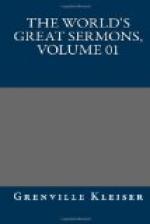with the outward eyes, not only the disciples who
honored Him saw, but also the Jews who crucified Him.
He, then, who wished to be seen in another way, sought
for other eyes. And, therefore, it was that to
him who said, “Show us the Father, and it sufficeth
us,” He answered, “Have I been so long
time with you, and yet hast thou not known Me, Philip?
He who hath seen Me hath seen the Father also.”
And that He might in the meanwhile heal the eyes of
faith, He has first of all given him instructions regarding
faith, that so he might attain to sight. And lest
Philip should think that he was to conceive of God
under the same form in which he then saw the Lord
Jesus Christ in the body, he immediately subjoined,
“Believest thou not that I am in the Father,
and the Father in me?” He had already said,
“He who hath seen me hath seen the Father also.”
But Philip’s eye was not yet sound enough to
see the Father, nor, consequently, to see the Son,
who is Himself coequal with the Father. And so
Jesus Christ took in hand to cure, and with the medicine
and salve of faith to strengthen the eyes of his mind,
which as yet were weak and unable to behold so great
a light, and He said, “Believest thou not that
I am in the Father, and the Father in Me?” Let
not him, then, who can not yet see what the Lord will
one day show him, seek first to see what he is to
believe; but let him first believe that the eye by
which he is to see may be healed. For it was
only the form of the servant which was exhibited to
the eyes of servants; because if “He who thought
it not robbery to be equal with God” could have
been now seen as equal with God by those whom He wished
to be healed, He would not have needed to empty Himself
and to take the form of a servant. But because
there was no way whereby God could be seen, but whereby
man could be seen there was; therefore, He who was
God was made man, that that which was seen might heal
that whereby He was not seen. For He saith Himself
in another place, “Blessed are the pure in heart,
for they shall see God.” Philip might,
of course, have answered and said, Lord, do I see Thee?
Is the Father such as I see Thee to be? Forasmuch
as Thou hast said, “He who hath seen Me hath
seen the Father also?” But before Philip answered
thus, or perhaps before he so much as thought it, when
the Lord had said, “He who hath seen Me hath
seen the Father also,” He immediately added,
“Believest thou not that I am in the Father,
and the Father in me?” For with that eye he
could not yet see either the Father, or the Son who
is equal with the Father; but that his eye might be
healed for seeing, he was anointed unto believing.
So, then, before thou seest what thou canst not now
see, believe what as yet thou seest not. “Walk
by faith,” that thou mayest attain to sight.
Sight will not gladden him in his home whom faith
consoleth not by the way. For, so says the apostle,
“As long as we are in the body we are absent
from the Lord.” And he subjoins immediately
why we are still “absent or in pilgrimage,”
tho we have now believed; “For we walk by faith,”
he says; “not by sight.”




